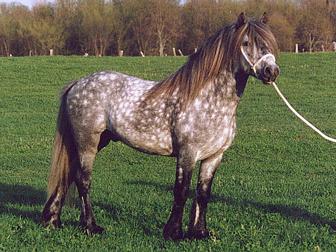
OVERVIEW
The Dales Pony has a near identical background to that of the Fell Pony. Both ponies are from the Pennine area of North Yorkshire, Durham, and Northumberland, England. Both also found their early beginnings in the Roman exported Friesian. The Dales has been used in the past primarily as a pack animal, due to its great strength. For some time the Dales was used underground, hauling lead and coal from mines. With its sure-footing, the Dales was also used for every task in Northern hill farms where the terrain was too rough for larger horses.
PHYSICAL DESCRIPTION
The head of the Dales should be sensible and pony-like. The muscular back and quarters with a deep girth are what give the Dales its power. Its sure-footedness is in part due to the broad and very hard hooves. The pony has an abundant mane and tail, and silky feathering around the ankle. Standing around 14 hh, the sensible and calm tempered Dales is exceptionally strong, known to carry a 225 lb. rider or pulling a load of one ton.
ORIGIN
The Dales most likely originates from Celtic pony origins. During Roman times the pony was crossed with Friesian blood giving it a notable action. Although traces of Clydesdale still remain in the character of the Dales, the practice of crossing the pony with Clydes was discouraged by the Dales Pony Society when it was founded in 1916. Before this, however, the Dales was crossed with the Welsh Cob to improve it for farm work. The most notable influence was the Welsh Cob, Comet, whose influence can be seen in every modern Dales.
INTERESTING FACTS
Although the Dales Pony has always been noted for its tremendous strength, the Welsh Cob, Comet, who had a great influence on the breed, added his own dominance. Comet was said to be able to trot 10 miles in 33 minutes carrying 168 lb. on his back. Such strength and endurance is what makes the pony one of today's most popular trekking ponies in the Dales.
INFLUENCES
1. Friesian
2. Welsh Cob
For more information:
Dales Pony Society of America
Listed as "Study" by The American Livestock Breeds Conservancy (2004)